Personal and Professional Development Report - Health and Social Care
VerifiedAdded on 2020/06/06
|12
|4182
|118
Report
AI Summary
This report provides a comprehensive analysis of personal and professional development within a health and social care setting. It begins with an introduction to the concepts of personal values and principles and their impact on healthcare practices. The report then delves into a self-evaluation, exploring the author's current skills, learning style, and the creation of a detailed development plan with short, medium, and long-term goals. The plan includes strategies for monitoring progress and assessing effectiveness. Furthermore, the report examines various professional relationships in the healthcare environment, focusing on promoting and supporting patient rights and resolving workplace issues. The author also reflects on their personal contributions, role limitations, and strategies for improving teamwork. The conclusion summarizes the key findings and emphasizes the importance of continuous self-improvement in the healthcare profession. The report includes references to support the analysis.
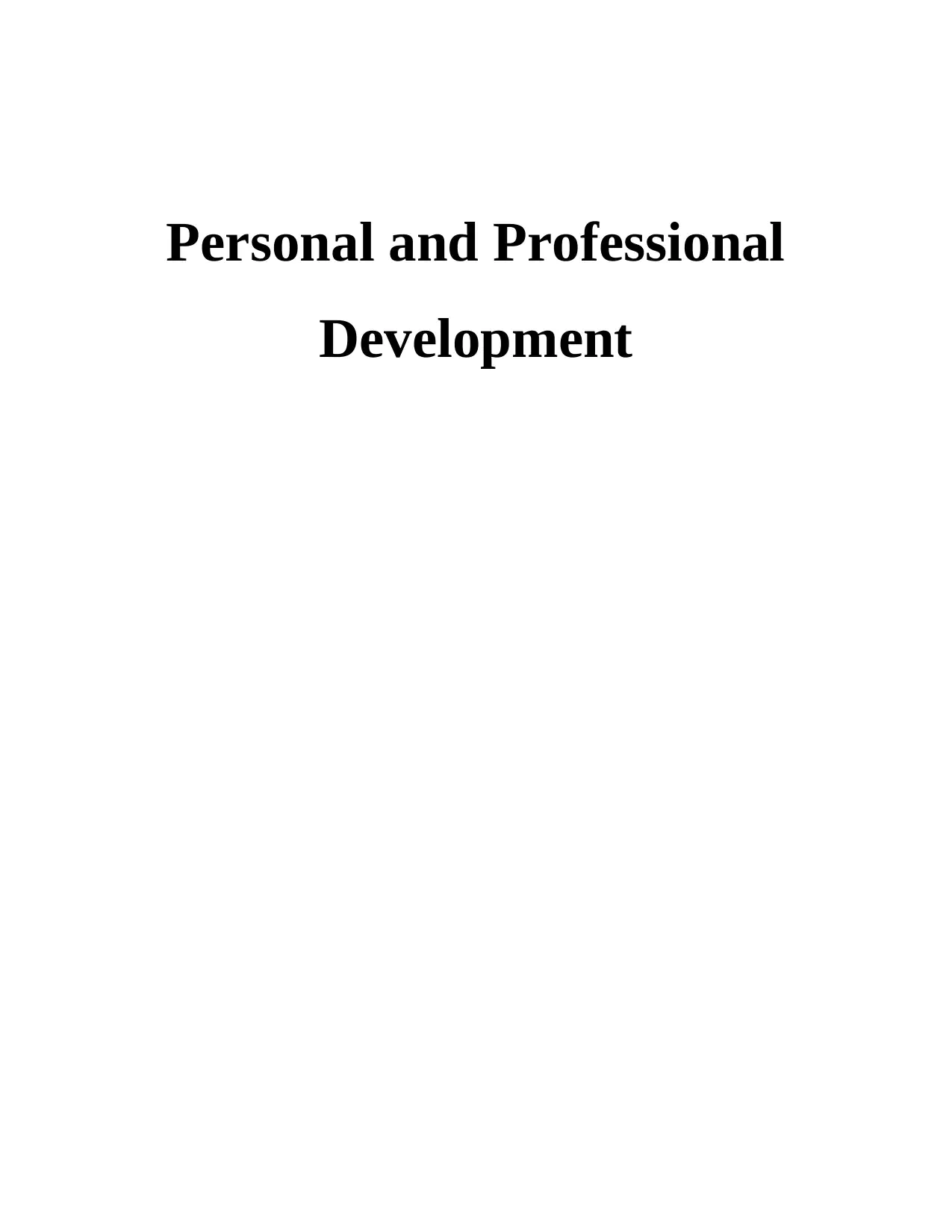
Personal and Professional
Development
Development
Paraphrase This Document
Need a fresh take? Get an instant paraphrase of this document with our AI Paraphraser
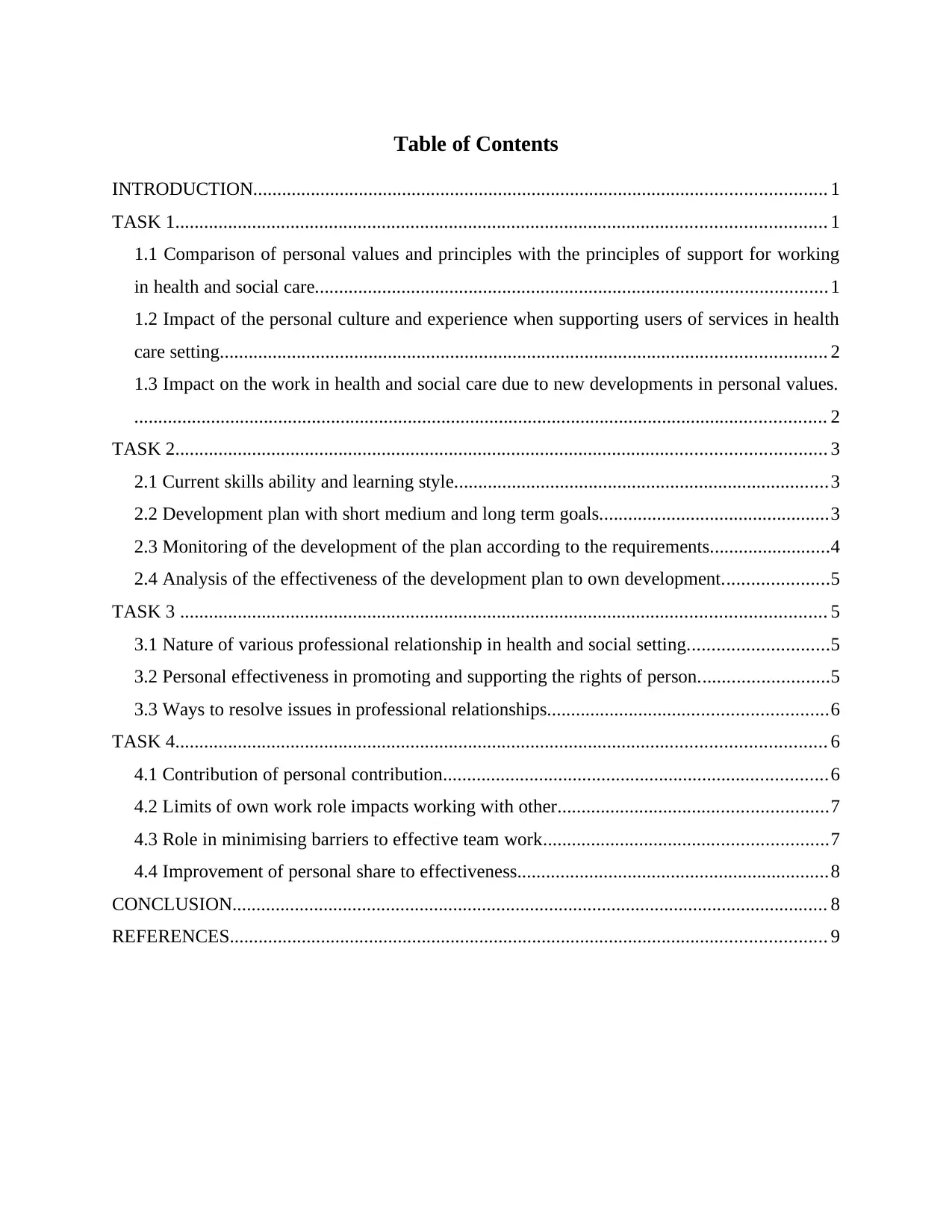
Table of Contents
INTRODUCTION....................................................................................................................... 1
TASK 1....................................................................................................................................... 1
1.1 Comparison of personal values and principles with the principles of support for working
in health and social care.......................................................................................................... 1
1.2 Impact of the personal culture and experience when supporting users of services in health
care setting.............................................................................................................................. 2
1.3 Impact on the work in health and social care due to new developments in personal values.
................................................................................................................................................ 2
TASK 2....................................................................................................................................... 3
2.1 Current skills ability and learning style..............................................................................3
2.2 Development plan with short medium and long term goals................................................3
2.3 Monitoring of the development of the plan according to the requirements.........................4
2.4 Analysis of the effectiveness of the development plan to own development......................5
TASK 3 ...................................................................................................................................... 5
3.1 Nature of various professional relationship in health and social setting.............................5
3.2 Personal effectiveness in promoting and supporting the rights of person...........................5
3.3 Ways to resolve issues in professional relationships..........................................................6
TASK 4....................................................................................................................................... 6
4.1 Contribution of personal contribution................................................................................6
4.2 Limits of own work role impacts working with other........................................................7
4.3 Role in minimising barriers to effective team work...........................................................7
4.4 Improvement of personal share to effectiveness.................................................................8
CONCLUSION............................................................................................................................ 8
REFERENCES............................................................................................................................ 9
INTRODUCTION....................................................................................................................... 1
TASK 1....................................................................................................................................... 1
1.1 Comparison of personal values and principles with the principles of support for working
in health and social care.......................................................................................................... 1
1.2 Impact of the personal culture and experience when supporting users of services in health
care setting.............................................................................................................................. 2
1.3 Impact on the work in health and social care due to new developments in personal values.
................................................................................................................................................ 2
TASK 2....................................................................................................................................... 3
2.1 Current skills ability and learning style..............................................................................3
2.2 Development plan with short medium and long term goals................................................3
2.3 Monitoring of the development of the plan according to the requirements.........................4
2.4 Analysis of the effectiveness of the development plan to own development......................5
TASK 3 ...................................................................................................................................... 5
3.1 Nature of various professional relationship in health and social setting.............................5
3.2 Personal effectiveness in promoting and supporting the rights of person...........................5
3.3 Ways to resolve issues in professional relationships..........................................................6
TASK 4....................................................................................................................................... 6
4.1 Contribution of personal contribution................................................................................6
4.2 Limits of own work role impacts working with other........................................................7
4.3 Role in minimising barriers to effective team work...........................................................7
4.4 Improvement of personal share to effectiveness.................................................................8
CONCLUSION............................................................................................................................ 8
REFERENCES............................................................................................................................ 9
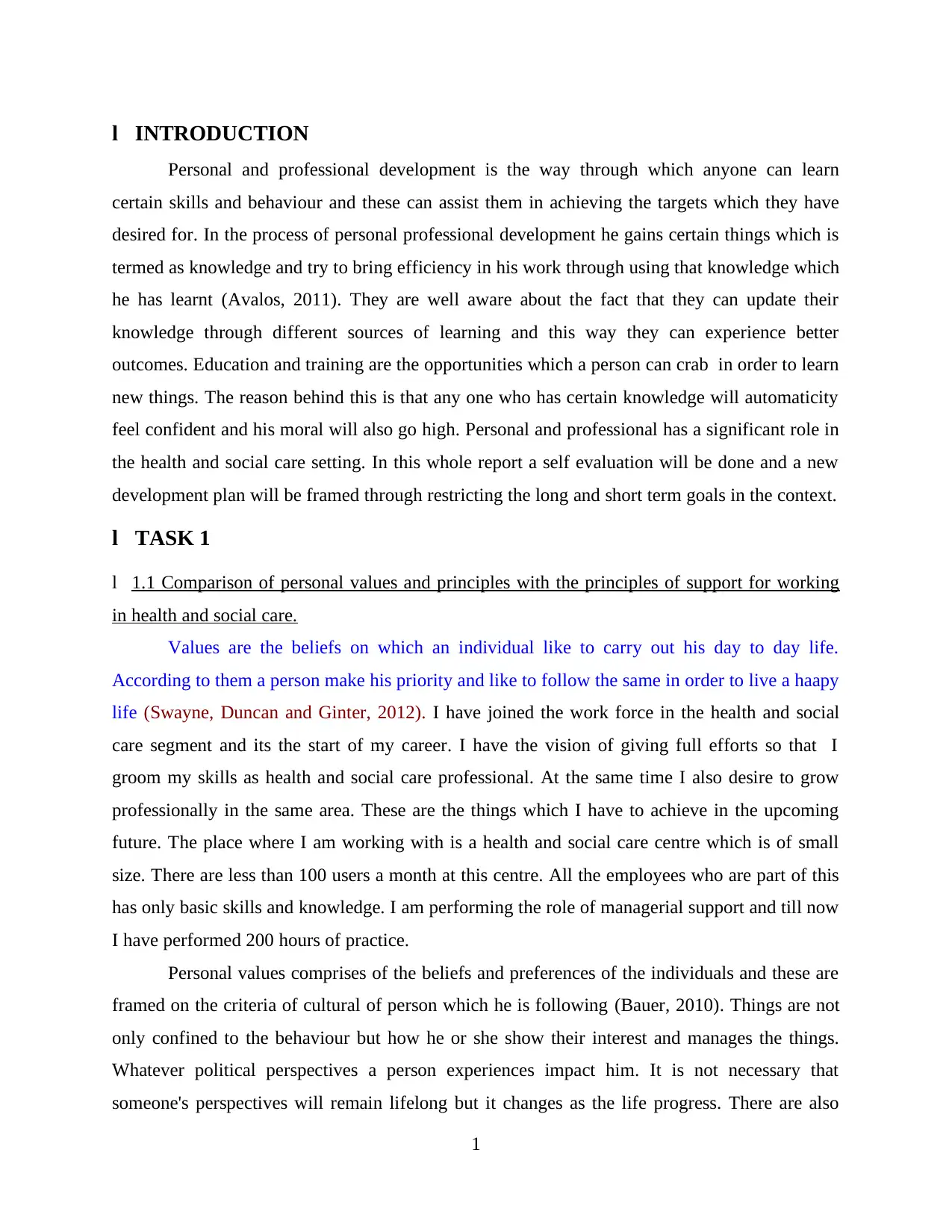
l壱INTRODUCTION
Personal and professional development is the way through which anyone can learn
certain skills and behaviour and these can assist them in achieving the targets which they have
desired for. In the process of personal professional development he gains certain things which is
termed as knowledge and try to bring efficiency in his work through using that knowledge which
he has learnt (Avalos, 2011). They are well aware about the fact that they can update their
knowledge through different sources of learning and this way they can experience better
outcomes. Education and training are the opportunities which a person can crab in order to learn
new things. The reason behind this is that any one who has certain knowledge will automaticity
feel confident and his moral will also go high. Personal and professional has a significant role in
the health and social care setting. In this whole report a self evaluation will be done and a new
development plan will be framed through restricting the long and short term goals in the context.
l壱TASK 1
l弐1.1 Comparison of personal values and principles with the principles of support for working
in health and social care.
Values are the beliefs on which an individual like to carry out his day to day life.
According to them a person make his priority and like to follow the same in order to live a haapy
life (Swayne, Duncan and Ginter, 2012). I have joined the work force in the health and social
care segment and its the start of my career. I have the vision of giving full efforts so that I
groom my skills as health and social care professional. At the same time I also desire to grow
professionally in the same area. These are the things which I have to achieve in the upcoming
future. The place where I am working with is a health and social care centre which is of small
size. There are less than 100 users a month at this centre. All the employees who are part of this
has only basic skills and knowledge. I am performing the role of managerial support and till now
I have performed 200 hours of practice.
Personal values comprises of the beliefs and preferences of the individuals and these are
framed on the criteria of cultural of person which he is following (Bauer, 2010). Things are not
only confined to the behaviour but how he or she show their interest and manages the things.
Whatever political perspectives a person experiences impact him. It is not necessary that
someone's perspectives will remain lifelong but it changes as the life progress. There are also
1
Personal and professional development is the way through which anyone can learn
certain skills and behaviour and these can assist them in achieving the targets which they have
desired for. In the process of personal professional development he gains certain things which is
termed as knowledge and try to bring efficiency in his work through using that knowledge which
he has learnt (Avalos, 2011). They are well aware about the fact that they can update their
knowledge through different sources of learning and this way they can experience better
outcomes. Education and training are the opportunities which a person can crab in order to learn
new things. The reason behind this is that any one who has certain knowledge will automaticity
feel confident and his moral will also go high. Personal and professional has a significant role in
the health and social care setting. In this whole report a self evaluation will be done and a new
development plan will be framed through restricting the long and short term goals in the context.
l壱TASK 1
l弐1.1 Comparison of personal values and principles with the principles of support for working
in health and social care.
Values are the beliefs on which an individual like to carry out his day to day life.
According to them a person make his priority and like to follow the same in order to live a haapy
life (Swayne, Duncan and Ginter, 2012). I have joined the work force in the health and social
care segment and its the start of my career. I have the vision of giving full efforts so that I
groom my skills as health and social care professional. At the same time I also desire to grow
professionally in the same area. These are the things which I have to achieve in the upcoming
future. The place where I am working with is a health and social care centre which is of small
size. There are less than 100 users a month at this centre. All the employees who are part of this
has only basic skills and knowledge. I am performing the role of managerial support and till now
I have performed 200 hours of practice.
Personal values comprises of the beliefs and preferences of the individuals and these are
framed on the criteria of cultural of person which he is following (Bauer, 2010). Things are not
only confined to the behaviour but how he or she show their interest and manages the things.
Whatever political perspectives a person experiences impact him. It is not necessary that
someone's perspectives will remain lifelong but it changes as the life progress. There are also
1
⊘ This is a preview!⊘
Do you want full access?
Subscribe today to unlock all pages.

Trusted by 1+ million students worldwide
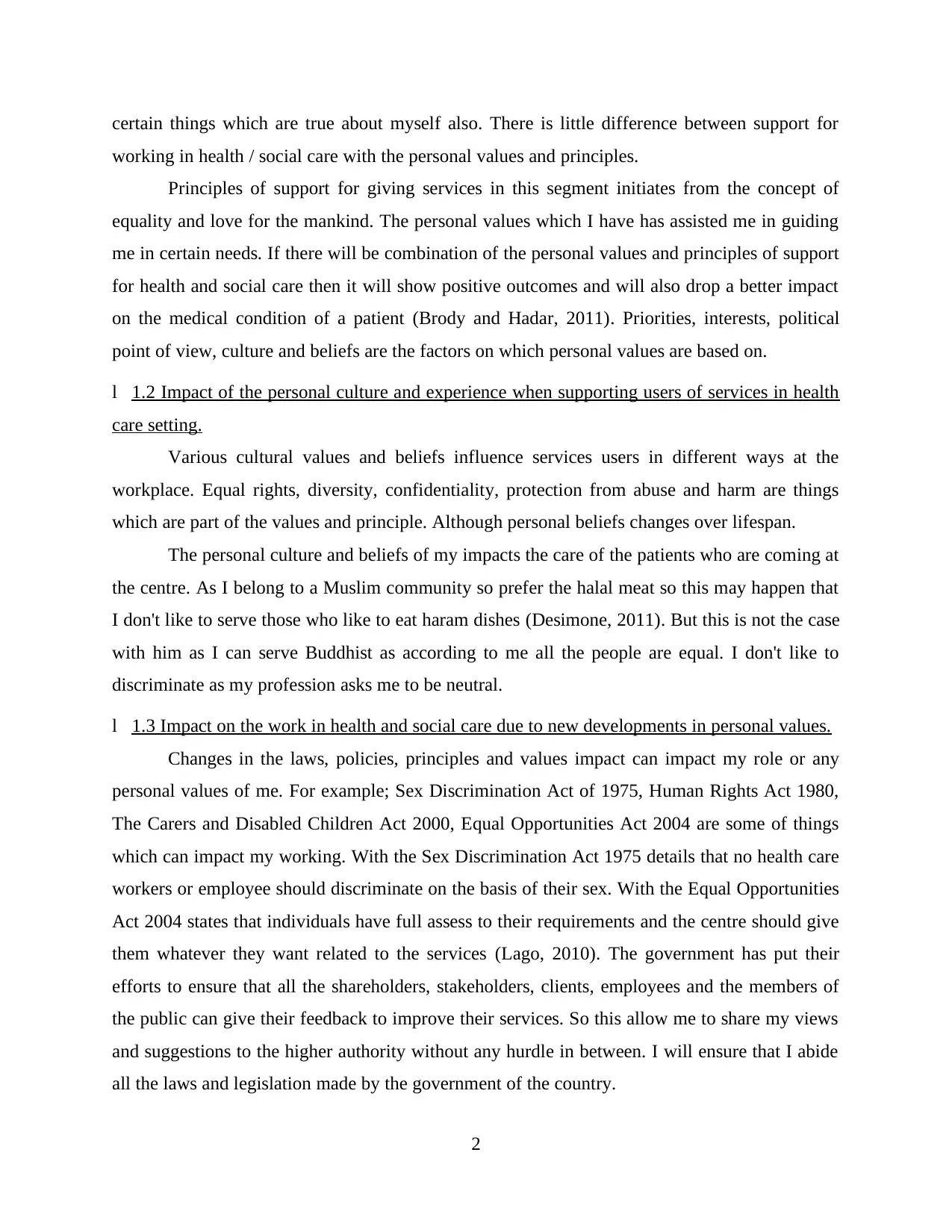
certain things which are true about myself also. There is little difference between support for
working in health / social care with the personal values and principles.
Principles of support for giving services in this segment initiates from the concept of
equality and love for the mankind. The personal values which I have has assisted me in guiding
me in certain needs. If there will be combination of the personal values and principles of support
for health and social care then it will show positive outcomes and will also drop a better impact
on the medical condition of a patient (Brody and Hadar, 2011). Priorities, interests, political
point of view, culture and beliefs are the factors on which personal values are based on.
l弐1.2 Impact of the personal culture and experience when supporting users of services in health
care setting.
Various cultural values and beliefs influence services users in different ways at the
workplace. Equal rights, diversity, confidentiality, protection from abuse and harm are things
which are part of the values and principle. Although personal beliefs changes over lifespan.
The personal culture and beliefs of my impacts the care of the patients who are coming at
the centre. As I belong to a Muslim community so prefer the halal meat so this may happen that
I don't like to serve those who like to eat haram dishes (Desimone, 2011). But this is not the case
with him as I can serve Buddhist as according to me all the people are equal. I don't like to
discriminate as my profession asks me to be neutral.
l弐1.3 Impact on the work in health and social care due to new developments in personal values.
Changes in the laws, policies, principles and values impact can impact my role or any
personal values of me. For example; Sex Discrimination Act of 1975, Human Rights Act 1980,
The Carers and Disabled Children Act 2000, Equal Opportunities Act 2004 are some of things
which can impact my working. With the Sex Discrimination Act 1975 details that no health care
workers or employee should discriminate on the basis of their sex. With the Equal Opportunities
Act 2004 states that individuals have full assess to their requirements and the centre should give
them whatever they want related to the services (Lago, 2010). The government has put their
efforts to ensure that all the shareholders, stakeholders, clients, employees and the members of
the public can give their feedback to improve their services. So this allow me to share my views
and suggestions to the higher authority without any hurdle in between. I will ensure that I abide
all the laws and legislation made by the government of the country.
2
working in health / social care with the personal values and principles.
Principles of support for giving services in this segment initiates from the concept of
equality and love for the mankind. The personal values which I have has assisted me in guiding
me in certain needs. If there will be combination of the personal values and principles of support
for health and social care then it will show positive outcomes and will also drop a better impact
on the medical condition of a patient (Brody and Hadar, 2011). Priorities, interests, political
point of view, culture and beliefs are the factors on which personal values are based on.
l弐1.2 Impact of the personal culture and experience when supporting users of services in health
care setting.
Various cultural values and beliefs influence services users in different ways at the
workplace. Equal rights, diversity, confidentiality, protection from abuse and harm are things
which are part of the values and principle. Although personal beliefs changes over lifespan.
The personal culture and beliefs of my impacts the care of the patients who are coming at
the centre. As I belong to a Muslim community so prefer the halal meat so this may happen that
I don't like to serve those who like to eat haram dishes (Desimone, 2011). But this is not the case
with him as I can serve Buddhist as according to me all the people are equal. I don't like to
discriminate as my profession asks me to be neutral.
l弐1.3 Impact on the work in health and social care due to new developments in personal values.
Changes in the laws, policies, principles and values impact can impact my role or any
personal values of me. For example; Sex Discrimination Act of 1975, Human Rights Act 1980,
The Carers and Disabled Children Act 2000, Equal Opportunities Act 2004 are some of things
which can impact my working. With the Sex Discrimination Act 1975 details that no health care
workers or employee should discriminate on the basis of their sex. With the Equal Opportunities
Act 2004 states that individuals have full assess to their requirements and the centre should give
them whatever they want related to the services (Lago, 2010). The government has put their
efforts to ensure that all the shareholders, stakeholders, clients, employees and the members of
the public can give their feedback to improve their services. So this allow me to share my views
and suggestions to the higher authority without any hurdle in between. I will ensure that I abide
all the laws and legislation made by the government of the country.
2
Paraphrase This Document
Need a fresh take? Get an instant paraphrase of this document with our AI Paraphraser
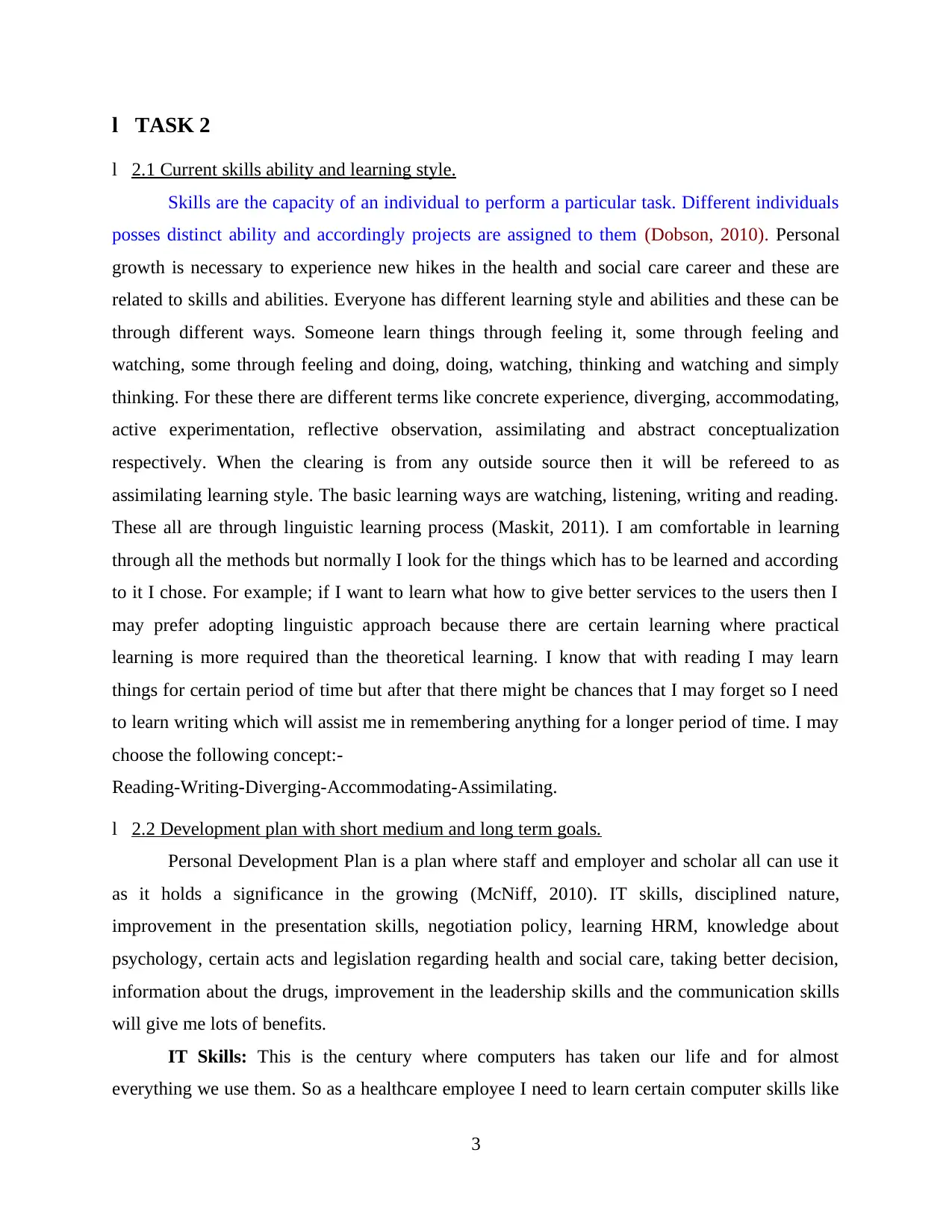
l壱TASK 2
l弐2.1 Current skills ability and learning style.
Skills are the capacity of an individual to perform a particular task. Different individuals
posses distinct ability and accordingly projects are assigned to them (Dobson, 2010). Personal
growth is necessary to experience new hikes in the health and social care career and these are
related to skills and abilities. Everyone has different learning style and abilities and these can be
through different ways. Someone learn things through feeling it, some through feeling and
watching, some through feeling and doing, doing, watching, thinking and watching and simply
thinking. For these there are different terms like concrete experience, diverging, accommodating,
active experimentation, reflective observation, assimilating and abstract conceptualization
respectively. When the clearing is from any outside source then it will be refereed to as
assimilating learning style. The basic learning ways are watching, listening, writing and reading.
These all are through linguistic learning process (Maskit, 2011). I am comfortable in learning
through all the methods but normally I look for the things which has to be learned and according
to it I chose. For example; if I want to learn what how to give better services to the users then I
may prefer adopting linguistic approach because there are certain learning where practical
learning is more required than the theoretical learning. I know that with reading I may learn
things for certain period of time but after that there might be chances that I may forget so I need
to learn writing which will assist me in remembering anything for a longer period of time. I may
choose the following concept:-
Reading-Writing-Diverging-Accommodating-Assimilating.
l弐2.2 Development plan with short medium and long term goals.
Personal Development Plan is a plan where staff and employer and scholar all can use it
as it holds a significance in the growing (McNiff, 2010). IT skills, disciplined nature,
improvement in the presentation skills, negotiation policy, learning HRM, knowledge about
psychology, certain acts and legislation regarding health and social care, taking better decision,
information about the drugs, improvement in the leadership skills and the communication skills
will give me lots of benefits.
IT Skills: This is the century where computers has taken our life and for almost
everything we use them. So as a healthcare employee I need to learn certain computer skills like
3
l弐2.1 Current skills ability and learning style.
Skills are the capacity of an individual to perform a particular task. Different individuals
posses distinct ability and accordingly projects are assigned to them (Dobson, 2010). Personal
growth is necessary to experience new hikes in the health and social care career and these are
related to skills and abilities. Everyone has different learning style and abilities and these can be
through different ways. Someone learn things through feeling it, some through feeling and
watching, some through feeling and doing, doing, watching, thinking and watching and simply
thinking. For these there are different terms like concrete experience, diverging, accommodating,
active experimentation, reflective observation, assimilating and abstract conceptualization
respectively. When the clearing is from any outside source then it will be refereed to as
assimilating learning style. The basic learning ways are watching, listening, writing and reading.
These all are through linguistic learning process (Maskit, 2011). I am comfortable in learning
through all the methods but normally I look for the things which has to be learned and according
to it I chose. For example; if I want to learn what how to give better services to the users then I
may prefer adopting linguistic approach because there are certain learning where practical
learning is more required than the theoretical learning. I know that with reading I may learn
things for certain period of time but after that there might be chances that I may forget so I need
to learn writing which will assist me in remembering anything for a longer period of time. I may
choose the following concept:-
Reading-Writing-Diverging-Accommodating-Assimilating.
l弐2.2 Development plan with short medium and long term goals.
Personal Development Plan is a plan where staff and employer and scholar all can use it
as it holds a significance in the growing (McNiff, 2010). IT skills, disciplined nature,
improvement in the presentation skills, negotiation policy, learning HRM, knowledge about
psychology, certain acts and legislation regarding health and social care, taking better decision,
information about the drugs, improvement in the leadership skills and the communication skills
will give me lots of benefits.
IT Skills: This is the century where computers has taken our life and for almost
everything we use them. So as a healthcare employee I need to learn certain computer skills like
3
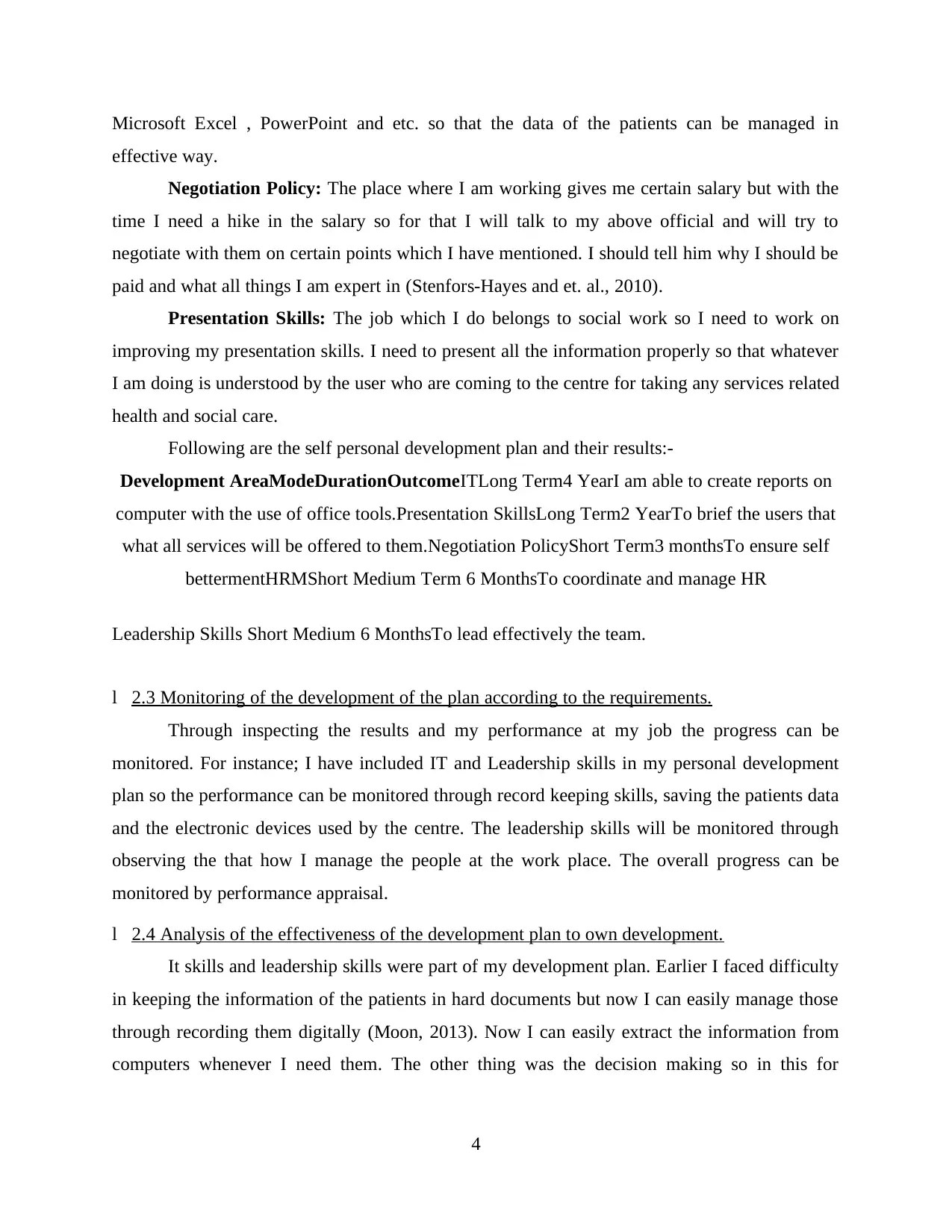
Microsoft Excel , PowerPoint and etc. so that the data of the patients can be managed in
effective way.
Negotiation Policy: The place where I am working gives me certain salary but with the
time I need a hike in the salary so for that I will talk to my above official and will try to
negotiate with them on certain points which I have mentioned. I should tell him why I should be
paid and what all things I am expert in (Stenfors-Hayes and et. al., 2010).
Presentation Skills: The job which I do belongs to social work so I need to work on
improving my presentation skills. I need to present all the information properly so that whatever
I am doing is understood by the user who are coming to the centre for taking any services related
health and social care.
Following are the self personal development plan and their results:-
Development AreaModeDurationOutcomeITLong Term4 YearI am able to create reports on
computer with the use of office tools.Presentation SkillsLong Term2 YearTo brief the users that
what all services will be offered to them.Negotiation PolicyShort Term3 monthsTo ensure self
bettermentHRMShort Medium Term 6 MonthsTo coordinate and manage HR
Leadership Skills Short Medium 6 MonthsTo lead effectively the team.
l弐2.3 Monitoring of the development of the plan according to the requirements.
Through inspecting the results and my performance at my job the progress can be
monitored. For instance; I have included IT and Leadership skills in my personal development
plan so the performance can be monitored through record keeping skills, saving the patients data
and the electronic devices used by the centre. The leadership skills will be monitored through
observing the that how I manage the people at the work place. The overall progress can be
monitored by performance appraisal.
l弐2.4 Analysis of the effectiveness of the development plan to own development.
It skills and leadership skills were part of my development plan. Earlier I faced difficulty
in keeping the information of the patients in hard documents but now I can easily manage those
through recording them digitally (Moon, 2013). Now I can easily extract the information from
computers whenever I need them. The other thing was the decision making so in this for
4
effective way.
Negotiation Policy: The place where I am working gives me certain salary but with the
time I need a hike in the salary so for that I will talk to my above official and will try to
negotiate with them on certain points which I have mentioned. I should tell him why I should be
paid and what all things I am expert in (Stenfors-Hayes and et. al., 2010).
Presentation Skills: The job which I do belongs to social work so I need to work on
improving my presentation skills. I need to present all the information properly so that whatever
I am doing is understood by the user who are coming to the centre for taking any services related
health and social care.
Following are the self personal development plan and their results:-
Development AreaModeDurationOutcomeITLong Term4 YearI am able to create reports on
computer with the use of office tools.Presentation SkillsLong Term2 YearTo brief the users that
what all services will be offered to them.Negotiation PolicyShort Term3 monthsTo ensure self
bettermentHRMShort Medium Term 6 MonthsTo coordinate and manage HR
Leadership Skills Short Medium 6 MonthsTo lead effectively the team.
l弐2.3 Monitoring of the development of the plan according to the requirements.
Through inspecting the results and my performance at my job the progress can be
monitored. For instance; I have included IT and Leadership skills in my personal development
plan so the performance can be monitored through record keeping skills, saving the patients data
and the electronic devices used by the centre. The leadership skills will be monitored through
observing the that how I manage the people at the work place. The overall progress can be
monitored by performance appraisal.
l弐2.4 Analysis of the effectiveness of the development plan to own development.
It skills and leadership skills were part of my development plan. Earlier I faced difficulty
in keeping the information of the patients in hard documents but now I can easily manage those
through recording them digitally (Moon, 2013). Now I can easily extract the information from
computers whenever I need them. The other thing was the decision making so in this for
4
⊘ This is a preview!⊘
Do you want full access?
Subscribe today to unlock all pages.

Trusted by 1+ million students worldwide
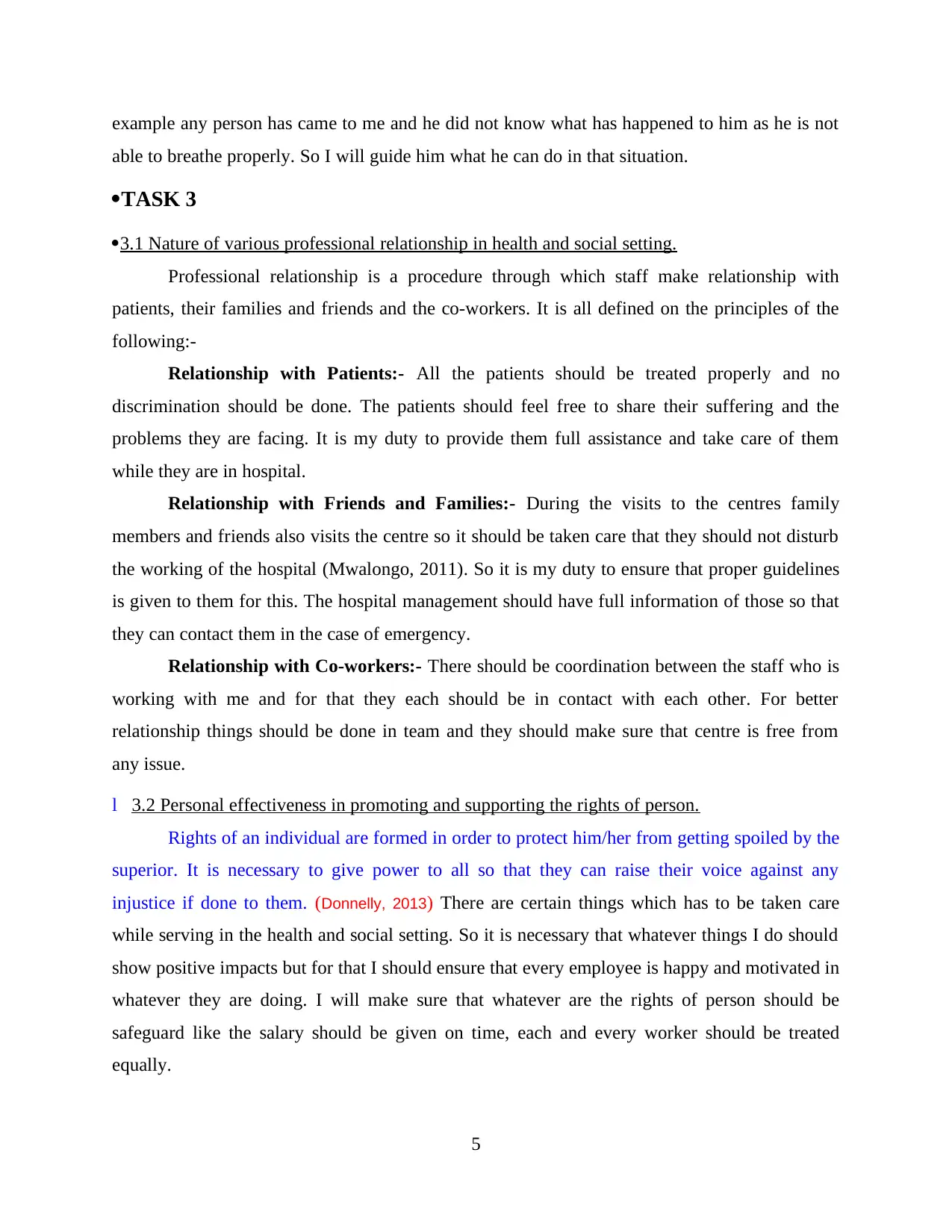
example any person has came to me and he did not know what has happened to him as he is not
able to breathe properly. So I will guide him what he can do in that situation.
·TASK 3
·3.1 Nature of various professional relationship in health and social setting.
Professional relationship is a procedure through which staff make relationship with
patients, their families and friends and the co-workers. It is all defined on the principles of the
following:-
Relationship with Patients:- All the patients should be treated properly and no
discrimination should be done. The patients should feel free to share their suffering and the
problems they are facing. It is my duty to provide them full assistance and take care of them
while they are in hospital.
Relationship with Friends and Families:- During the visits to the centres family
members and friends also visits the centre so it should be taken care that they should not disturb
the working of the hospital (Mwalongo, 2011). So it is my duty to ensure that proper guidelines
is given to them for this. The hospital management should have full information of those so that
they can contact them in the case of emergency.
Relationship with Co-workers:- There should be coordination between the staff who is
working with me and for that they each should be in contact with each other. For better
relationship things should be done in team and they should make sure that centre is free from
any issue.
l弐3.2 Personal effectiveness in promoting and supporting the rights of person.
Rights of an individual are formed in order to protect him/her from getting spoiled by the
superior. It is necessary to give power to all so that they can raise their voice against any
injustice if done to them. (Donnelly, 2013) There are certain things which has to be taken care
while serving in the health and social setting. So it is necessary that whatever things I do should
show positive impacts but for that I should ensure that every employee is happy and motivated in
whatever they are doing. I will make sure that whatever are the rights of person should be
safeguard like the salary should be given on time, each and every worker should be treated
equally.
5
able to breathe properly. So I will guide him what he can do in that situation.
·TASK 3
·3.1 Nature of various professional relationship in health and social setting.
Professional relationship is a procedure through which staff make relationship with
patients, their families and friends and the co-workers. It is all defined on the principles of the
following:-
Relationship with Patients:- All the patients should be treated properly and no
discrimination should be done. The patients should feel free to share their suffering and the
problems they are facing. It is my duty to provide them full assistance and take care of them
while they are in hospital.
Relationship with Friends and Families:- During the visits to the centres family
members and friends also visits the centre so it should be taken care that they should not disturb
the working of the hospital (Mwalongo, 2011). So it is my duty to ensure that proper guidelines
is given to them for this. The hospital management should have full information of those so that
they can contact them in the case of emergency.
Relationship with Co-workers:- There should be coordination between the staff who is
working with me and for that they each should be in contact with each other. For better
relationship things should be done in team and they should make sure that centre is free from
any issue.
l弐3.2 Personal effectiveness in promoting and supporting the rights of person.
Rights of an individual are formed in order to protect him/her from getting spoiled by the
superior. It is necessary to give power to all so that they can raise their voice against any
injustice if done to them. (Donnelly, 2013) There are certain things which has to be taken care
while serving in the health and social setting. So it is necessary that whatever things I do should
show positive impacts but for that I should ensure that every employee is happy and motivated in
whatever they are doing. I will make sure that whatever are the rights of person should be
safeguard like the salary should be given on time, each and every worker should be treated
equally.
5
Paraphrase This Document
Need a fresh take? Get an instant paraphrase of this document with our AI Paraphraser
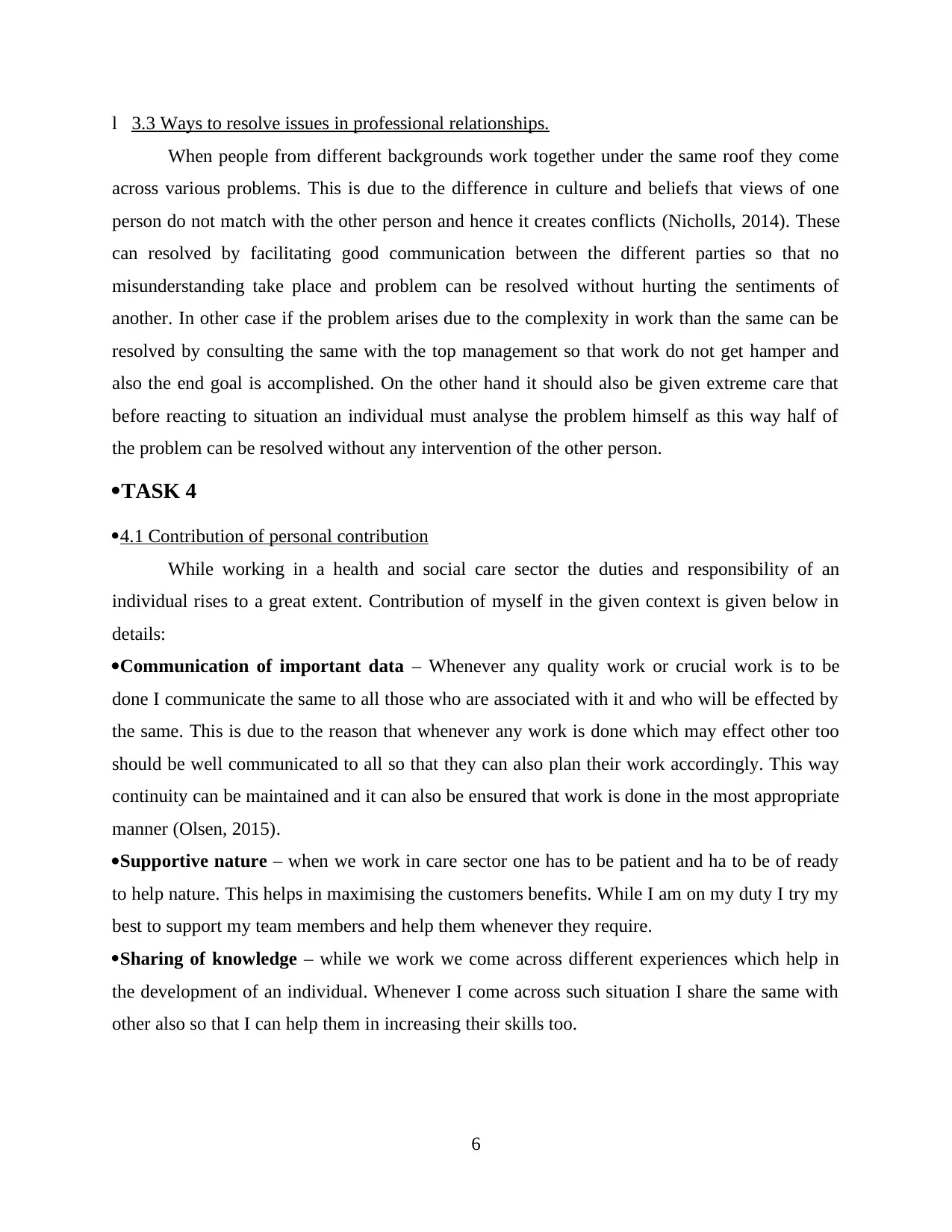
l弐3.3 Ways to resolve issues in professional relationships.
When people from different backgrounds work together under the same roof they come
across various problems. This is due to the difference in culture and beliefs that views of one
person do not match with the other person and hence it creates conflicts (Nicholls, 2014). These
can resolved by facilitating good communication between the different parties so that no
misunderstanding take place and problem can be resolved without hurting the sentiments of
another. In other case if the problem arises due to the complexity in work than the same can be
resolved by consulting the same with the top management so that work do not get hamper and
also the end goal is accomplished. On the other hand it should also be given extreme care that
before reacting to situation an individual must analyse the problem himself as this way half of
the problem can be resolved without any intervention of the other person.
·TASK 4
·4.1 Contribution of personal contribution
While working in a health and social care sector the duties and responsibility of an
individual rises to a great extent. Contribution of myself in the given context is given below in
details:
·Communication of important data – Whenever any quality work or crucial work is to be
done I communicate the same to all those who are associated with it and who will be effected by
the same. This is due to the reason that whenever any work is done which may effect other too
should be well communicated to all so that they can also plan their work accordingly. This way
continuity can be maintained and it can also be ensured that work is done in the most appropriate
manner (Olsen, 2015).
·Supportive nature – when we work in care sector one has to be patient and ha to be of ready
to help nature. This helps in maximising the customers benefits. While I am on my duty I try my
best to support my team members and help them whenever they require.
·Sharing of knowledge – while we work we come across different experiences which help in
the development of an individual. Whenever I come across such situation I share the same with
other also so that I can help them in increasing their skills too.
6
When people from different backgrounds work together under the same roof they come
across various problems. This is due to the difference in culture and beliefs that views of one
person do not match with the other person and hence it creates conflicts (Nicholls, 2014). These
can resolved by facilitating good communication between the different parties so that no
misunderstanding take place and problem can be resolved without hurting the sentiments of
another. In other case if the problem arises due to the complexity in work than the same can be
resolved by consulting the same with the top management so that work do not get hamper and
also the end goal is accomplished. On the other hand it should also be given extreme care that
before reacting to situation an individual must analyse the problem himself as this way half of
the problem can be resolved without any intervention of the other person.
·TASK 4
·4.1 Contribution of personal contribution
While working in a health and social care sector the duties and responsibility of an
individual rises to a great extent. Contribution of myself in the given context is given below in
details:
·Communication of important data – Whenever any quality work or crucial work is to be
done I communicate the same to all those who are associated with it and who will be effected by
the same. This is due to the reason that whenever any work is done which may effect other too
should be well communicated to all so that they can also plan their work accordingly. This way
continuity can be maintained and it can also be ensured that work is done in the most appropriate
manner (Olsen, 2015).
·Supportive nature – when we work in care sector one has to be patient and ha to be of ready
to help nature. This helps in maximising the customers benefits. While I am on my duty I try my
best to support my team members and help them whenever they require.
·Sharing of knowledge – while we work we come across different experiences which help in
the development of an individual. Whenever I come across such situation I share the same with
other also so that I can help them in increasing their skills too.
6
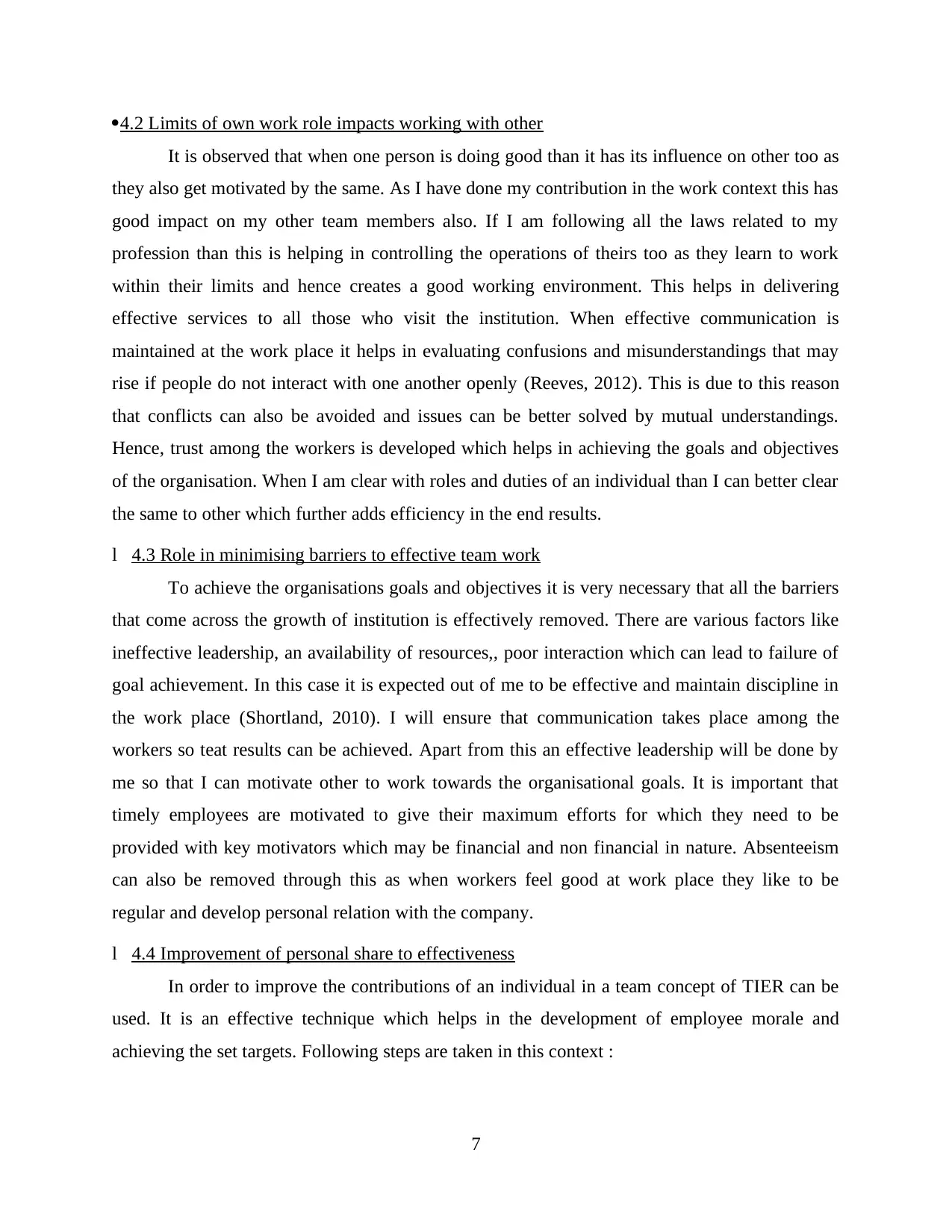
·4.2 Limits of own work role impacts working with other
It is observed that when one person is doing good than it has its influence on other too as
they also get motivated by the same. As I have done my contribution in the work context this has
good impact on my other team members also. If I am following all the laws related to my
profession than this is helping in controlling the operations of theirs too as they learn to work
within their limits and hence creates a good working environment. This helps in delivering
effective services to all those who visit the institution. When effective communication is
maintained at the work place it helps in evaluating confusions and misunderstandings that may
rise if people do not interact with one another openly (Reeves, 2012). This is due to this reason
that conflicts can also be avoided and issues can be better solved by mutual understandings.
Hence, trust among the workers is developed which helps in achieving the goals and objectives
of the organisation. When I am clear with roles and duties of an individual than I can better clear
the same to other which further adds efficiency in the end results.
l弐4.3 Role in minimising barriers to effective team work
To achieve the organisations goals and objectives it is very necessary that all the barriers
that come across the growth of institution is effectively removed. There are various factors like
ineffective leadership, an availability of resources,, poor interaction which can lead to failure of
goal achievement. In this case it is expected out of me to be effective and maintain discipline in
the work place (Shortland, 2010). I will ensure that communication takes place among the
workers so teat results can be achieved. Apart from this an effective leadership will be done by
me so that I can motivate other to work towards the organisational goals. It is important that
timely employees are motivated to give their maximum efforts for which they need to be
provided with key motivators which may be financial and non financial in nature. Absenteeism
can also be removed through this as when workers feel good at work place they like to be
regular and develop personal relation with the company.
l弐4.4 Improvement of personal share to effectiveness
In order to improve the contributions of an individual in a team concept of TIER can be
used. It is an effective technique which helps in the development of employee morale and
achieving the set targets. Following steps are taken in this context :
7
It is observed that when one person is doing good than it has its influence on other too as
they also get motivated by the same. As I have done my contribution in the work context this has
good impact on my other team members also. If I am following all the laws related to my
profession than this is helping in controlling the operations of theirs too as they learn to work
within their limits and hence creates a good working environment. This helps in delivering
effective services to all those who visit the institution. When effective communication is
maintained at the work place it helps in evaluating confusions and misunderstandings that may
rise if people do not interact with one another openly (Reeves, 2012). This is due to this reason
that conflicts can also be avoided and issues can be better solved by mutual understandings.
Hence, trust among the workers is developed which helps in achieving the goals and objectives
of the organisation. When I am clear with roles and duties of an individual than I can better clear
the same to other which further adds efficiency in the end results.
l弐4.3 Role in minimising barriers to effective team work
To achieve the organisations goals and objectives it is very necessary that all the barriers
that come across the growth of institution is effectively removed. There are various factors like
ineffective leadership, an availability of resources,, poor interaction which can lead to failure of
goal achievement. In this case it is expected out of me to be effective and maintain discipline in
the work place (Shortland, 2010). I will ensure that communication takes place among the
workers so teat results can be achieved. Apart from this an effective leadership will be done by
me so that I can motivate other to work towards the organisational goals. It is important that
timely employees are motivated to give their maximum efforts for which they need to be
provided with key motivators which may be financial and non financial in nature. Absenteeism
can also be removed through this as when workers feel good at work place they like to be
regular and develop personal relation with the company.
l弐4.4 Improvement of personal share to effectiveness
In order to improve the contributions of an individual in a team concept of TIER can be
used. It is an effective technique which helps in the development of employee morale and
achieving the set targets. Following steps are taken in this context :
7
⊘ This is a preview!⊘
Do you want full access?
Subscribe today to unlock all pages.

Trusted by 1+ million students worldwide
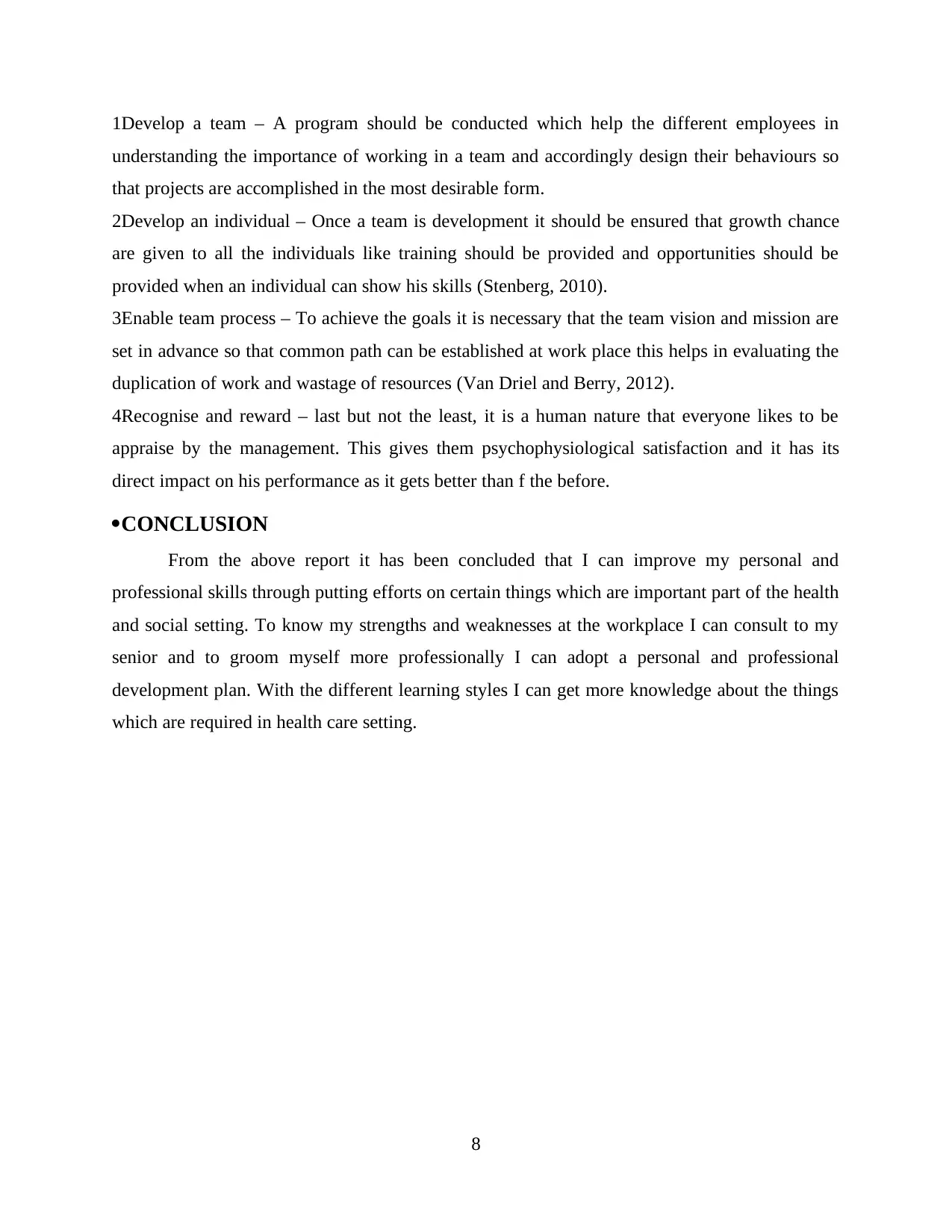
1Develop a team – A program should be conducted which help the different employees in
understanding the importance of working in a team and accordingly design their behaviours so
that projects are accomplished in the most desirable form.
2Develop an individual – Once a team is development it should be ensured that growth chance
are given to all the individuals like training should be provided and opportunities should be
provided when an individual can show his skills (Stenberg, 2010).
3Enable team process – To achieve the goals it is necessary that the team vision and mission are
set in advance so that common path can be established at work place this helps in evaluating the
duplication of work and wastage of resources (Van Driel and Berry, 2012).
4Recognise and reward – last but not the least, it is a human nature that everyone likes to be
appraise by the management. This gives them psychophysiological satisfaction and it has its
direct impact on his performance as it gets better than f the before.
·CONCLUSION
From the above report it has been concluded that I can improve my personal and
professional skills through putting efforts on certain things which are important part of the health
and social setting. To know my strengths and weaknesses at the workplace I can consult to my
senior and to groom myself more professionally I can adopt a personal and professional
development plan. With the different learning styles I can get more knowledge about the things
which are required in health care setting.
8
understanding the importance of working in a team and accordingly design their behaviours so
that projects are accomplished in the most desirable form.
2Develop an individual – Once a team is development it should be ensured that growth chance
are given to all the individuals like training should be provided and opportunities should be
provided when an individual can show his skills (Stenberg, 2010).
3Enable team process – To achieve the goals it is necessary that the team vision and mission are
set in advance so that common path can be established at work place this helps in evaluating the
duplication of work and wastage of resources (Van Driel and Berry, 2012).
4Recognise and reward – last but not the least, it is a human nature that everyone likes to be
appraise by the management. This gives them psychophysiological satisfaction and it has its
direct impact on his performance as it gets better than f the before.
·CONCLUSION
From the above report it has been concluded that I can improve my personal and
professional skills through putting efforts on certain things which are important part of the health
and social setting. To know my strengths and weaknesses at the workplace I can consult to my
senior and to groom myself more professionally I can adopt a personal and professional
development plan. With the different learning styles I can get more knowledge about the things
which are required in health care setting.
8
Paraphrase This Document
Need a fresh take? Get an instant paraphrase of this document with our AI Paraphraser
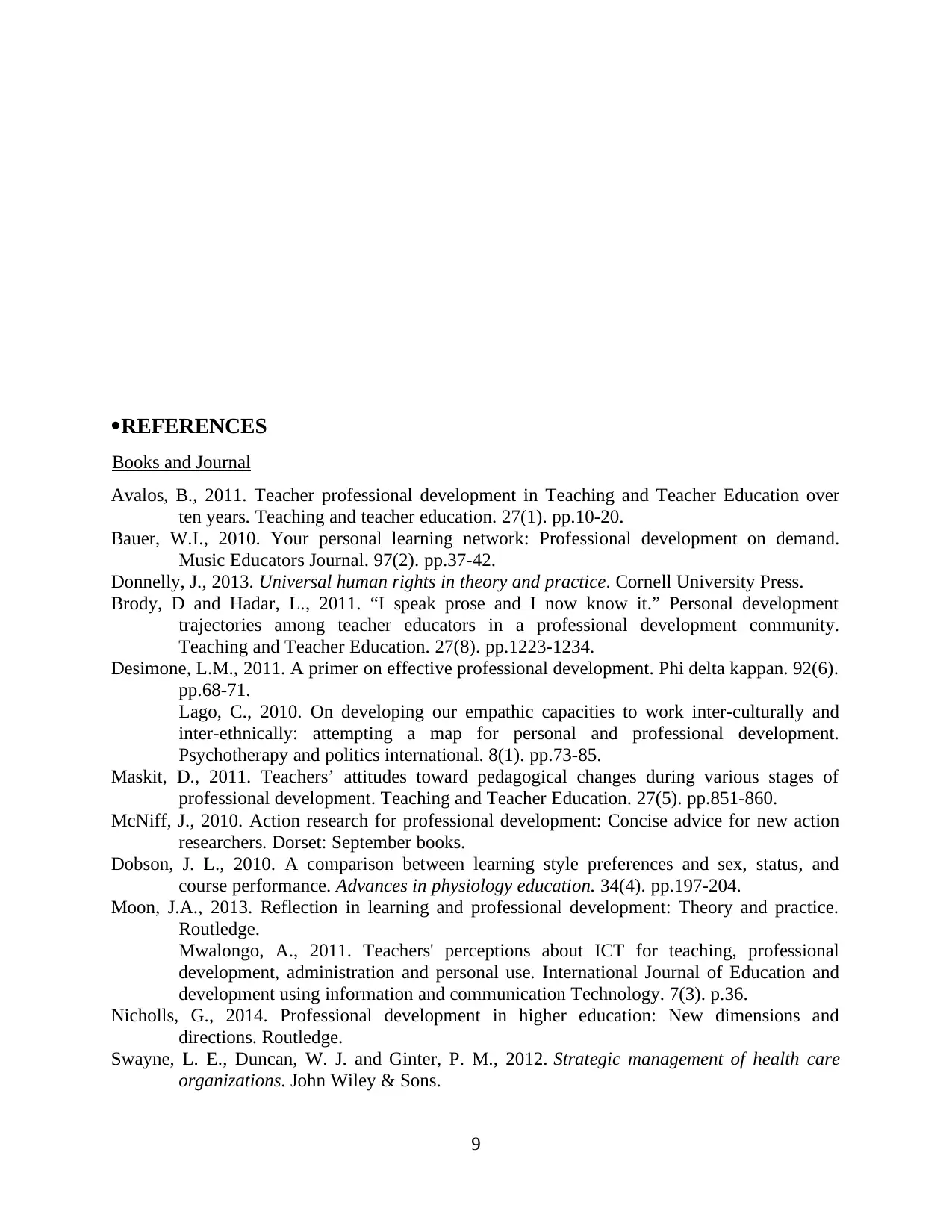
·REFERENCES
Books and Journal
Avalos, B., 2011. Teacher professional development in Teaching and Teacher Education over
ten years. Teaching and teacher education. 27(1). pp.10-20.
Bauer, W.I., 2010. Your personal learning network: Professional development on demand.
Music Educators Journal. 97(2). pp.37-42.
Donnelly, J., 2013. Universal human rights in theory and practice. Cornell University Press.
Brody, D and Hadar, L., 2011. “I speak prose and I now know it.” Personal development
trajectories among teacher educators in a professional development community.
Teaching and Teacher Education. 27(8). pp.1223-1234.
Desimone, L.M., 2011. A primer on effective professional development. Phi delta kappan. 92(6).
pp.68-71.
Lago, C., 2010. On developing our empathic capacities to work inter-culturally and
inter-ethnically: attempting a map for personal and professional development.
Psychotherapy and politics international. 8(1). pp.73-85.
Maskit, D., 2011. Teachers’ attitudes toward pedagogical changes during various stages of
professional development. Teaching and Teacher Education. 27(5). pp.851-860.
McNiff, J., 2010. Action research for professional development: Concise advice for new action
researchers. Dorset: September books.
Dobson, J. L., 2010. A comparison between learning style preferences and sex, status, and
course performance. Advances in physiology education. 34(4). pp.197-204.
Moon, J.A., 2013. Reflection in learning and professional development: Theory and practice.
Routledge.
Mwalongo, A., 2011. Teachers' perceptions about ICT for teaching, professional
development, administration and personal use. International Journal of Education and
development using information and communication Technology. 7(3). p.36.
Nicholls, G., 2014. Professional development in higher education: New dimensions and
directions. Routledge.
Swayne, L. E., Duncan, W. J. and Ginter, P. M., 2012. Strategic management of health care
organizations. John Wiley & Sons.
9
Books and Journal
Avalos, B., 2011. Teacher professional development in Teaching and Teacher Education over
ten years. Teaching and teacher education. 27(1). pp.10-20.
Bauer, W.I., 2010. Your personal learning network: Professional development on demand.
Music Educators Journal. 97(2). pp.37-42.
Donnelly, J., 2013. Universal human rights in theory and practice. Cornell University Press.
Brody, D and Hadar, L., 2011. “I speak prose and I now know it.” Personal development
trajectories among teacher educators in a professional development community.
Teaching and Teacher Education. 27(8). pp.1223-1234.
Desimone, L.M., 2011. A primer on effective professional development. Phi delta kappan. 92(6).
pp.68-71.
Lago, C., 2010. On developing our empathic capacities to work inter-culturally and
inter-ethnically: attempting a map for personal and professional development.
Psychotherapy and politics international. 8(1). pp.73-85.
Maskit, D., 2011. Teachers’ attitudes toward pedagogical changes during various stages of
professional development. Teaching and Teacher Education. 27(5). pp.851-860.
McNiff, J., 2010. Action research for professional development: Concise advice for new action
researchers. Dorset: September books.
Dobson, J. L., 2010. A comparison between learning style preferences and sex, status, and
course performance. Advances in physiology education. 34(4). pp.197-204.
Moon, J.A., 2013. Reflection in learning and professional development: Theory and practice.
Routledge.
Mwalongo, A., 2011. Teachers' perceptions about ICT for teaching, professional
development, administration and personal use. International Journal of Education and
development using information and communication Technology. 7(3). p.36.
Nicholls, G., 2014. Professional development in higher education: New dimensions and
directions. Routledge.
Swayne, L. E., Duncan, W. J. and Ginter, P. M., 2012. Strategic management of health care
organizations. John Wiley & Sons.
9
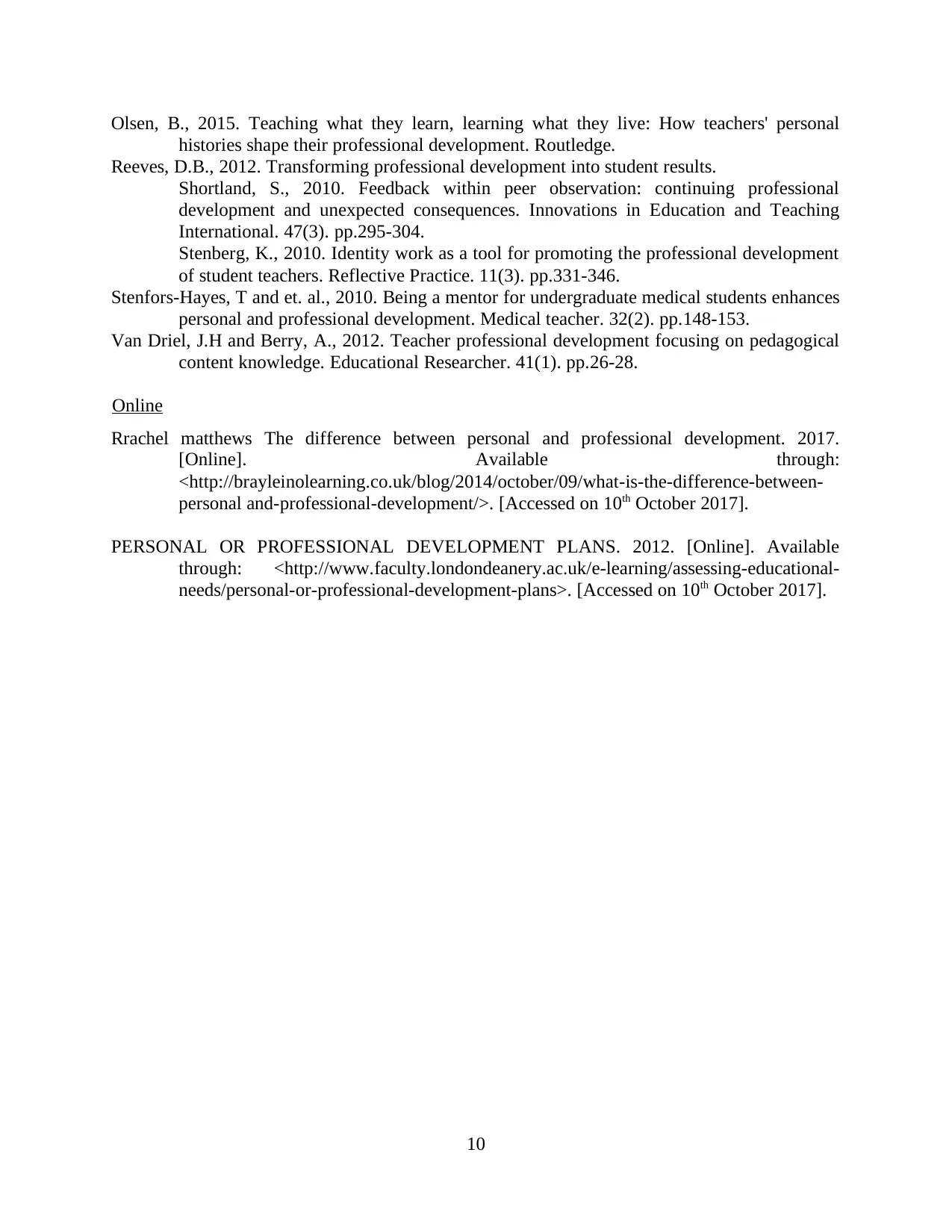
Olsen, B., 2015. Teaching what they learn, learning what they live: How teachers' personal
histories shape their professional development. Routledge.
Reeves, D.B., 2012. Transforming professional development into student results.
Shortland, S., 2010. Feedback within peer observation: continuing professional
development and unexpected consequences. Innovations in Education and Teaching
International. 47(3). pp.295-304.
Stenberg, K., 2010. Identity work as a tool for promoting the professional development
of student teachers. Reflective Practice. 11(3). pp.331-346.
Stenfors-Hayes, T and et. al., 2010. Being a mentor for undergraduate medical students enhances
personal and professional development. Medical teacher. 32(2). pp.148-153.
Van Driel, J.H and Berry, A., 2012. Teacher professional development focusing on pedagogical
content knowledge. Educational Researcher. 41(1). pp.26-28.
Online
Rrachel matthews The difference between personal and professional development. 2017.
[Online]. Available through:
<http://brayleinolearning.co.uk/blog/2014/october/09/what-is-the-difference-between-
personal and-professional-development/>. [Accessed on 10th October 2017].
PERSONAL OR PROFESSIONAL DEVELOPMENT PLANS. 2012. [Online]. Available
through: <http://www.faculty.londondeanery.ac.uk/e-learning/assessing-educational-
needs/personal-or-professional-development-plans>. [Accessed on 10th October 2017].
10
histories shape their professional development. Routledge.
Reeves, D.B., 2012. Transforming professional development into student results.
Shortland, S., 2010. Feedback within peer observation: continuing professional
development and unexpected consequences. Innovations in Education and Teaching
International. 47(3). pp.295-304.
Stenberg, K., 2010. Identity work as a tool for promoting the professional development
of student teachers. Reflective Practice. 11(3). pp.331-346.
Stenfors-Hayes, T and et. al., 2010. Being a mentor for undergraduate medical students enhances
personal and professional development. Medical teacher. 32(2). pp.148-153.
Van Driel, J.H and Berry, A., 2012. Teacher professional development focusing on pedagogical
content knowledge. Educational Researcher. 41(1). pp.26-28.
Online
Rrachel matthews The difference between personal and professional development. 2017.
[Online]. Available through:
<http://brayleinolearning.co.uk/blog/2014/october/09/what-is-the-difference-between-
personal and-professional-development/>. [Accessed on 10th October 2017].
PERSONAL OR PROFESSIONAL DEVELOPMENT PLANS. 2012. [Online]. Available
through: <http://www.faculty.londondeanery.ac.uk/e-learning/assessing-educational-
needs/personal-or-professional-development-plans>. [Accessed on 10th October 2017].
10
⊘ This is a preview!⊘
Do you want full access?
Subscribe today to unlock all pages.

Trusted by 1+ million students worldwide
1 out of 12
Related Documents
Your All-in-One AI-Powered Toolkit for Academic Success.
+13062052269
info@desklib.com
Available 24*7 on WhatsApp / Email
![[object Object]](/_next/static/media/star-bottom.7253800d.svg)
Unlock your academic potential
Copyright © 2020–2026 A2Z Services. All Rights Reserved. Developed and managed by ZUCOL.





